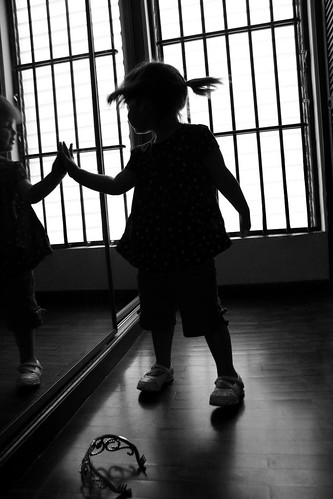A few days before the 2013 Oscars, I was reading some online commentary about the nominees. In the middle of the page was a picture of Quvenzhané Wallis from the set of Beasts of the Southern Wild. My two-year-old daughter peered over my shoulder, pointed to Wallis’ face, and said her own name.
I could certainly see the resemblance: the beautiful, untethered curls; the brown skin; the big, shining eyes. My daughter literally saw herself in this amazing young woman, the youngest person nominated for a Best Actress award and one of the very few people of color recognized by the Academy that night. I was happy that there are representations in media for my daughter to see that will remind her of herself. The tagline from Miss Representation (a documentary on the state of women in media portrayals) tells us “you can’t be what you can’t see.” My hope—like the hope of most parents—is that my daughter can be anything.
I didn’t think much of that moment. It was fleeting and sweet. Then The Onion tweet referring to Wallis as a “cunt” popped up in my feed. I had already muted the Academy Awards show itself because I was so worn out from the constant misogyny on the screen, and the tweet literally made my jaw drop. I joined the chorus of voices on social media urging people to unfollow The Onion and to voice their disapproval. Some of the comments that I got back shocked me. People that I love and respect, people who identify themselves as feminists and fight for equality, those people told me that they understood where The Onion was coming from. They said it was satire aimed to demonstrate the way misogyny operates in Hollywood. When I protested, saying that aiming that sexualized word at a young Black girl was beyond the line of satire, that young Black girls are already sexualized and abused disproportionately in our culture, I was told that race had nothing to do with it. I was told I was being oversensitive.
I would go on to read several articles about the tweet and the feminist response to it over the following days. I watched many mainstream feminist sites ignore it completely. I watched several mainstream feminist voices defend it. Even on sites that criticized The Onion and used intersectionality as a framework for that criticism, I watched the comments fill with self-proclaimed feminists explaining to the rest of us how we just “didn’t get” the joke. I fought and argued online until I couldn’t sleep at night, angered by the responses, frustrated with the community of feminists in which I had found so much comfort and support in the past, and terrified about the revelations I was making about myself.
I am a white feminist. I am privileged in many, many ways. The parts of feminism that resonate the strongest with me are the ones that touch my own life. Having always been an equality-minded person, I didn’t consciously define myself as a feminist until I became pregnant and suddenly saw that so much of the “everyone is equal” mantra I had been hearing and ostensibly living was lip service. When I had a need for feminism, it was there, and I clung to it gratefully. The friends, support, and ideas I have found in the feminist community have been nothing short of life affirming.
In my journey through feminism, I would read and hear women of color saying that they felt left out of the movement. I would watch in-fighting happen over whether breastfeeding was feminist or anti-feminist, whether a mother staying home with her children could be a feminist act, and whether feminists could wear makeup. I always thought that these women who told me they felt unwelcome in the movement because of race were taking a segment of the movement and extrapolating it to the whole. Perhaps they’d met a single woman who identified herself as a feminist who had a blind spot to race issues and let her stand in for all of us. Surely, I told myself, a movement predicated on recognizing privilege and oppression could not be blind to racism, could not be blind to the intersection at which women of color sat, could not be blind to the fact that race matters.
I was wrong.
It took the tweet about Quvenzhané Wallis to show me that I was wrong, and then I began to examine everything I could within the movement I love. Suddenly the silences, the gaps, and the missing pieces were evident everywhere. Suddenly I found all of the posts from women of color discussing these flaws, and I know that they were there all along, and I hate that I didn’t see them before.
More than anything, though, I hate that I will never know how much my daughter pointing to Wallis’ face and seeing her own made that recognition possible for me. Did being in an interracial marriage and raising a biracial daughter make me more likely to get outraged? If that tweet hadn’t touched on my life in a personal way, would I have stayed silent, too?
I want to say that of course I wouldn’t have stayed silent. Of course I would have stood up to the misogyny and racism in that tweet whether I had a daughter or not, let alone whether or not my daughter looked like Wallis. The truth is, though, that I can never know that. I can only live within the life I actually have, and I am now left constantly asking what other experiences am I unintentionally ignoring. What other silences am I letting pass? What else has my privilege blinded me against? Most importantly, how do I make sure I break those barriers down? How do I make sure I see without putting the burden on another little girl to be objectified and oppressed in order for me to learn a lesson I should have already known?
Note: I wrote this immediately following the Oscars, but never published it. I am publishing it now as I try to unpack some of the same tensions I've seen in reactions to the Zimmerman verdict and my own anxieties about what that case means for my parenting. I hope to follow it up with a Part 2.
I didn’t think much of that moment. It was fleeting and sweet. Then The Onion tweet referring to Wallis as a “cunt” popped up in my feed. I had already muted the Academy Awards show itself because I was so worn out from the constant misogyny on the screen, and the tweet literally made my jaw drop. I joined the chorus of voices on social media urging people to unfollow The Onion and to voice their disapproval. Some of the comments that I got back shocked me. People that I love and respect, people who identify themselves as feminists and fight for equality, those people told me that they understood where The Onion was coming from. They said it was satire aimed to demonstrate the way misogyny operates in Hollywood. When I protested, saying that aiming that sexualized word at a young Black girl was beyond the line of satire, that young Black girls are already sexualized and abused disproportionately in our culture, I was told that race had nothing to do with it. I was told I was being oversensitive.
I would go on to read several articles about the tweet and the feminist response to it over the following days. I watched many mainstream feminist sites ignore it completely. I watched several mainstream feminist voices defend it. Even on sites that criticized The Onion and used intersectionality as a framework for that criticism, I watched the comments fill with self-proclaimed feminists explaining to the rest of us how we just “didn’t get” the joke. I fought and argued online until I couldn’t sleep at night, angered by the responses, frustrated with the community of feminists in which I had found so much comfort and support in the past, and terrified about the revelations I was making about myself.
I am a white feminist. I am privileged in many, many ways. The parts of feminism that resonate the strongest with me are the ones that touch my own life. Having always been an equality-minded person, I didn’t consciously define myself as a feminist until I became pregnant and suddenly saw that so much of the “everyone is equal” mantra I had been hearing and ostensibly living was lip service. When I had a need for feminism, it was there, and I clung to it gratefully. The friends, support, and ideas I have found in the feminist community have been nothing short of life affirming.
In my journey through feminism, I would read and hear women of color saying that they felt left out of the movement. I would watch in-fighting happen over whether breastfeeding was feminist or anti-feminist, whether a mother staying home with her children could be a feminist act, and whether feminists could wear makeup. I always thought that these women who told me they felt unwelcome in the movement because of race were taking a segment of the movement and extrapolating it to the whole. Perhaps they’d met a single woman who identified herself as a feminist who had a blind spot to race issues and let her stand in for all of us. Surely, I told myself, a movement predicated on recognizing privilege and oppression could not be blind to racism, could not be blind to the intersection at which women of color sat, could not be blind to the fact that race matters.
I was wrong.
It took the tweet about Quvenzhané Wallis to show me that I was wrong, and then I began to examine everything I could within the movement I love. Suddenly the silences, the gaps, and the missing pieces were evident everywhere. Suddenly I found all of the posts from women of color discussing these flaws, and I know that they were there all along, and I hate that I didn’t see them before.
More than anything, though, I hate that I will never know how much my daughter pointing to Wallis’ face and seeing her own made that recognition possible for me. Did being in an interracial marriage and raising a biracial daughter make me more likely to get outraged? If that tweet hadn’t touched on my life in a personal way, would I have stayed silent, too?
I want to say that of course I wouldn’t have stayed silent. Of course I would have stood up to the misogyny and racism in that tweet whether I had a daughter or not, let alone whether or not my daughter looked like Wallis. The truth is, though, that I can never know that. I can only live within the life I actually have, and I am now left constantly asking what other experiences am I unintentionally ignoring. What other silences am I letting pass? What else has my privilege blinded me against? Most importantly, how do I make sure I break those barriers down? How do I make sure I see without putting the burden on another little girl to be objectified and oppressed in order for me to learn a lesson I should have already known?
Note: I wrote this immediately following the Oscars, but never published it. I am publishing it now as I try to unpack some of the same tensions I've seen in reactions to the Zimmerman verdict and my own anxieties about what that case means for my parenting. I hope to follow it up with a Part 2.




I love this post. Feminism definitely has a few big problems and one of them is race. I love how you explain it here, because that's exactly what it feels like. Only recently have SOME white feminist groups gotten involved in the immigration debate, which affects predominantly Asian and Latino families everyday. And they have remained, in most cases, extremely silent when it comes to race as a feminist issue as well. I feel the same as you...how is it possible, that a group who struggles with subjugation and oppression, cannot see the struggles of their sisters of color??? HOW???
ReplyDelete